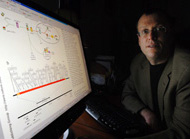Defending Memory from Alzheimer’s
BU geneticists help uncover new gene for debilitating disease

Alzheimer’s disease does more than steal its victims’ memories — gradually, it kills their identities. About a decade ago, scientists discovered the first genetic link to this progressive dementia afflicting more than four million Americans. Now, Boston University geneticists, collaborating with an international team of researchers, have uncovered a second major genetic association with Alzheimer’s. Their discoveries are outlined in a paper published in this month’s issue of Nature Genetics.
Along with researchers from the University of Toronto and Columbia University, the BU scientists analyzed the DNA of about 6,800 individuals from nine populations, representing four main ethnic groups (Caucasians, African-Americans, Caribbean-Hispanics, and Israeli-Arabs). They found that variants of the SORL1 gene were more common in people with late-onset Alzheimer’s, the most common form of the disease.
Lead BU researcher Lindsay Farrer, a School of Medicine professor and chief of the genetics program, describes the protein produced by SORL1 as a kind of “traffic cop” in human cells, directing other proteins and molecules where they can and can’t go. One of the key pieces of this intercellular traffic pattern is amyloid precursor protein (APP). When SORL1 is functioning normally, Farrer and his team believe, its protein shuttles APP down a pathway where it metabolizes harmlessly. But, they believe, the genetic variants of SORL1 either reduce the amount of this traffic cop protein or they lead to an altered variety that allows APP to stray into a region of the cell where it degrades into its toxic form, leading to plaques that, in Farrer’s words, “gunk up the brain.”
At this point, that biological scenario remains a hypothesis. What the researchers have found is an association between gene variants and Alzheimer’s disease. The replication of this finding across several populations gives the association strength and scientific validity, but, Farrer notes, “people should not be thinking they can go get their SORL1 gene analyzed and then make a prediction that they will or won’t get Alzheimer’s based on it.”
Fully understanding the biological mechanism that underlies these associations is complicated by the unusually large size of SORL1, which contains at least 500 known variants. So far, researchers have examined only about 30. Further discoveries, says Farrer, will most likely require the type of multi-institution effort that was the hallmark of the initial research.
BU geneticists are already engaged in several collaborative efforts. The Alzheimer’s researchers, for example, have been contributing their data and DNA specimens (when subjects consent) to a national repository that can be used by other researchers. And in September 2006, the MED department of genetics and genomics launched a Genetic Medicine Database (GMED), a searchable collection of prepublication results from BU researchers’ genetic analysis of 320 families from the Framingham Heart Study, the long-running epidemiological study begun by the National Heart, Lung, and Blood Institute in 1948 and run by BU since 1971.
Farrer and his fellow researchers plan to continue investigating the SORL1 gene in order to zero in on the “biologically causal variants.” They’ll also begin investigations of related genes “to see if [SORL1] has any co-conspirators.” Farrer says that SORL1 is an “attractive therapeutic target” because of its genetic association with Alzheimer’s and its role in APP processing. Eventually, he says, “we will begin working with others who have greater pharmacological and cell biological expertise than us, in order to try to translate this finding into a possible treatment.”
Chris Berdik can be reached at cberdik@bu.edu.